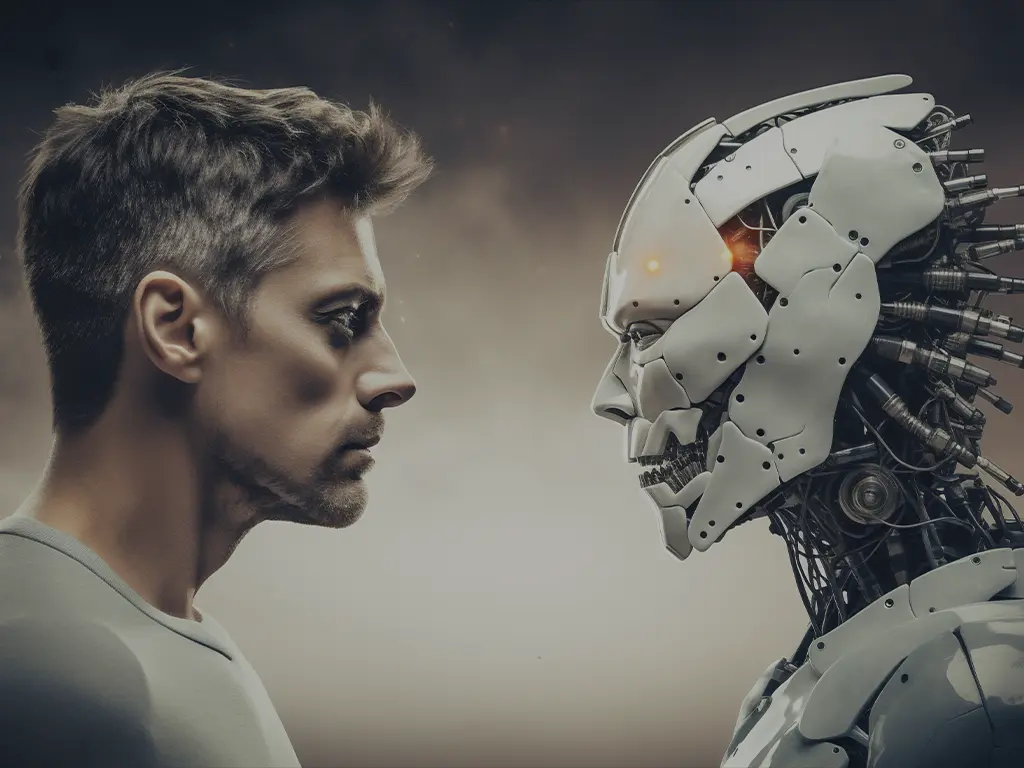Human intelligence and Artificial intelligence (AI) are engaged in an epic dance; while each influences the world in their own way. However, the question remains whether they are really equivalent? Let’s enter the ring and see who the superhero is, Human Intelligence vs Artificial Intelligence. AI showdown, highlighting strengths and weaknesses of these two mighty players.
On one hand, the human mind possesses an irreplaceable trait of being creative. We conceive the most imaginative things, write marvelous pieces of art, and use craftiness to solve problems. Having high social skills, we can deal with different social situations, perceive emotions, and develop our communities. In addition, we possess an exceptional capacity of adaptation, as we can learn as we go, and modify our behavior and reactions depending on what is happening at that moment.
Human Intelligence: The Original Innovator
The intelligence of humankind is the ultimate force behind every invention, every masterpiece of art, as well as every other scientific invention.
- Creativity: We don’t just make sense of things, we dream. The possibility of creating completely new ideas, composing music which moves us, and painting pictures which express the beauty of our world, is always right there in front of us.
- Social Intelligence: We’re made of connection. We make connections with others, experience feelings, tackle relationship issues and create lively societies. These social skills ensure successful teamwork and information dissemination from one generation to another.
- Adaptability: The world throws surprises, and humans are guzzlers of inventiveness. We can quickly acquire new skills, navigate unfamiliar surroundings, and rapidly develop viable solutions. This helps us adapt and deal effectively with a forever-changing environment.
Yet, despite this extraordinary intellect, there is always a breakage. We can be:
- Biased: Our personal experiences and feelings cannot fail to affect our perception. While our unconscious biases may influence the way we make decisions and put objectivity at risk.
- Limited by Knowledge: We can only assimilate so much information and stay attentive. While our knowledge may continue to grow, it’s a limited resource in comparison with the endless data processing capability of AI.
- Susceptible to Fatigue: Focus and concentration and like muscles they can get exhausted. Long-running mental fatigue might gradually interfere with our decision-making skills and obscure our minds.
AI: The Evolving Powerhouse in the Human Intelligence vs Artificial Intelligence Matchup
While human intelligence reigns supreme in creativity and social skills, AI brings a different set of strengths to the table. Here’s how AI is transforming various fields:
Data Processing Powerhouse:
AI excels at analyzing massive datasets. It can sift through mountains of information at lightning speed, uncovering hidden patterns and trends invisible to the human eye. This superpower makes AI invaluable in fields like finance, healthcare, and scientific research, where vast amounts of data hold valuable insights.
Accuracy Champion:
Repetitive tasks are AI’s bread and butter. AI algorithms can perform these tasks with exceptional precision and consistency, far exceeding human capabilities. Imagine tirelessly analyzing medical scans or processing financial transactions – AI handles it flawlessly, minimizing errors and ensuring efficiency.
24/7 Work Ethic:
Unlike humans who succumb to fatigue, AI never needs a break. It can work tirelessly around the clock, performing continuous analysis and computations. This unwavering work ethic allows AI to monitor systems for anomalies, optimize processes in real-time, and deliver results without interruption.
However, it’s important to acknowledge AI’s limitations in the Human Intelligence vs Artificial Intelligence matchup. While powerful, AI still faces some hurdles:
Limited Understanding:
AI struggles with tasks that require real-world context and common sense. Understanding subtle nuances of human behavior or navigating unexpected situations remains a challenge for AI.
Creativity Gap:
AI can’t truly generate original ideas on its own. It relies heavily on existing data sets to learn and make predictions. This limits its ability to come up with groundbreaking concepts or solutions that require a spark of genuine creativity.
Ethical Considerations:
Present bias in data can especially lead to biased AI decisions. This, however, brings up ethical questions, especially in applications of AI such as law enforcement or financial approvals. Eliminating bias in AI development is still one of the most complex issues.
Among these drawbacks, AI in collaboration with human intelligence cannot be neglected. The integration of human creativity and problem-solving skills with AI’s processing power and efficiency will unlock a world full of opportunities ahead.
The Future: Together we make a dance, not a duel.
The Human Intelligence vs Artificial Intelligence debate should be presented as a contest. The future is ours to share. Humans and AI together make AI truly ingenious.
Imagine AI like a tireless data analyst working with human imagination in a directed manner. For example, AI may do repetitive tasks like assembly line operations with perfection, which will give the human opportunity to work on complex problem solving.
Humans together with AI have massive potential for progress. As AI tends to become more and more advanced, the dynamics of this teamwork will inevitably change. But one thing remains certain: definitely, the future belongs to those who can make use of both human nature and AI technologies.
We can take advantage of human creative thinking for strategic designs and innovative problem-solving approaches, AI carrying out the laborious task of data analysis and repetitive tasks. This frees us to focus on what humans do best: create the most innovative of ideas and solve problems smartly.

